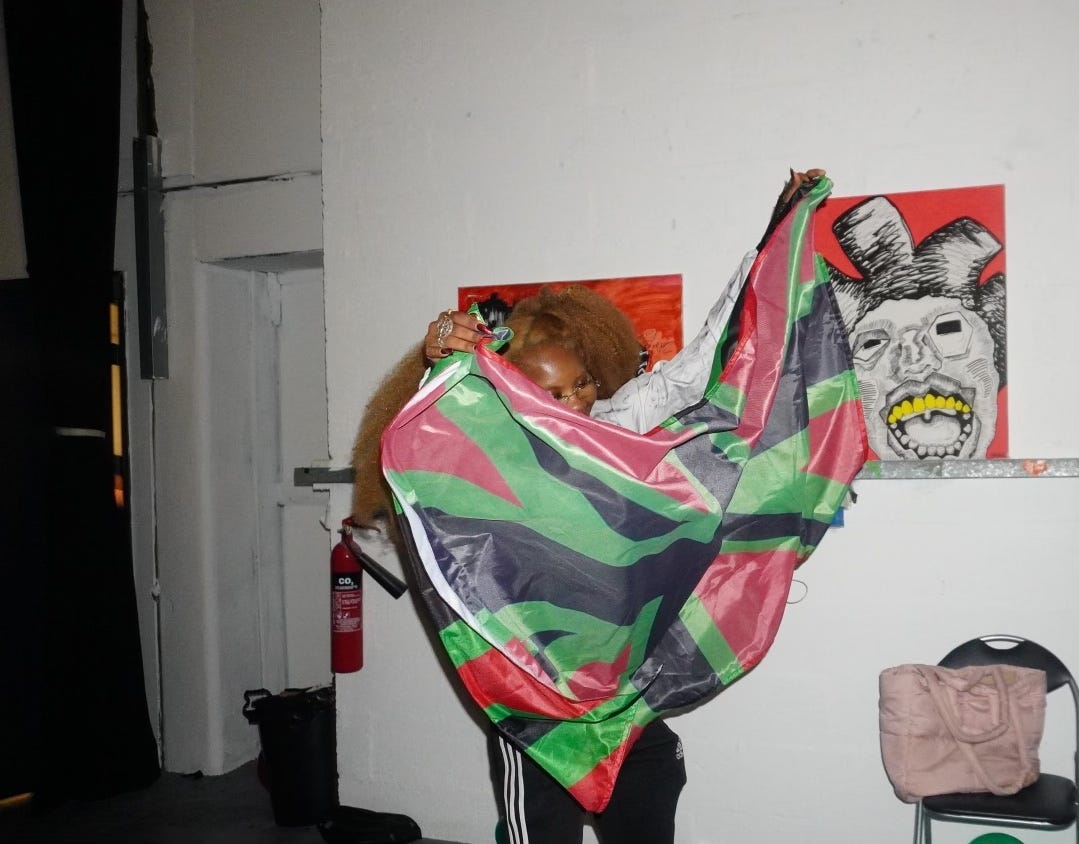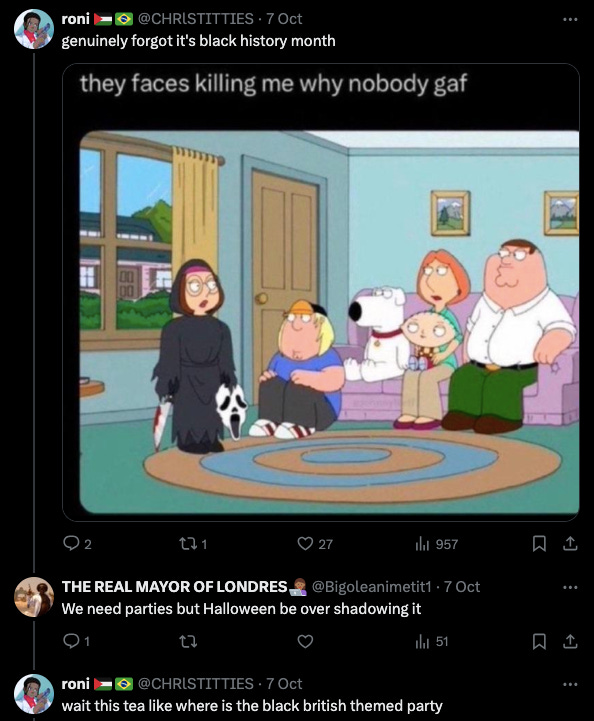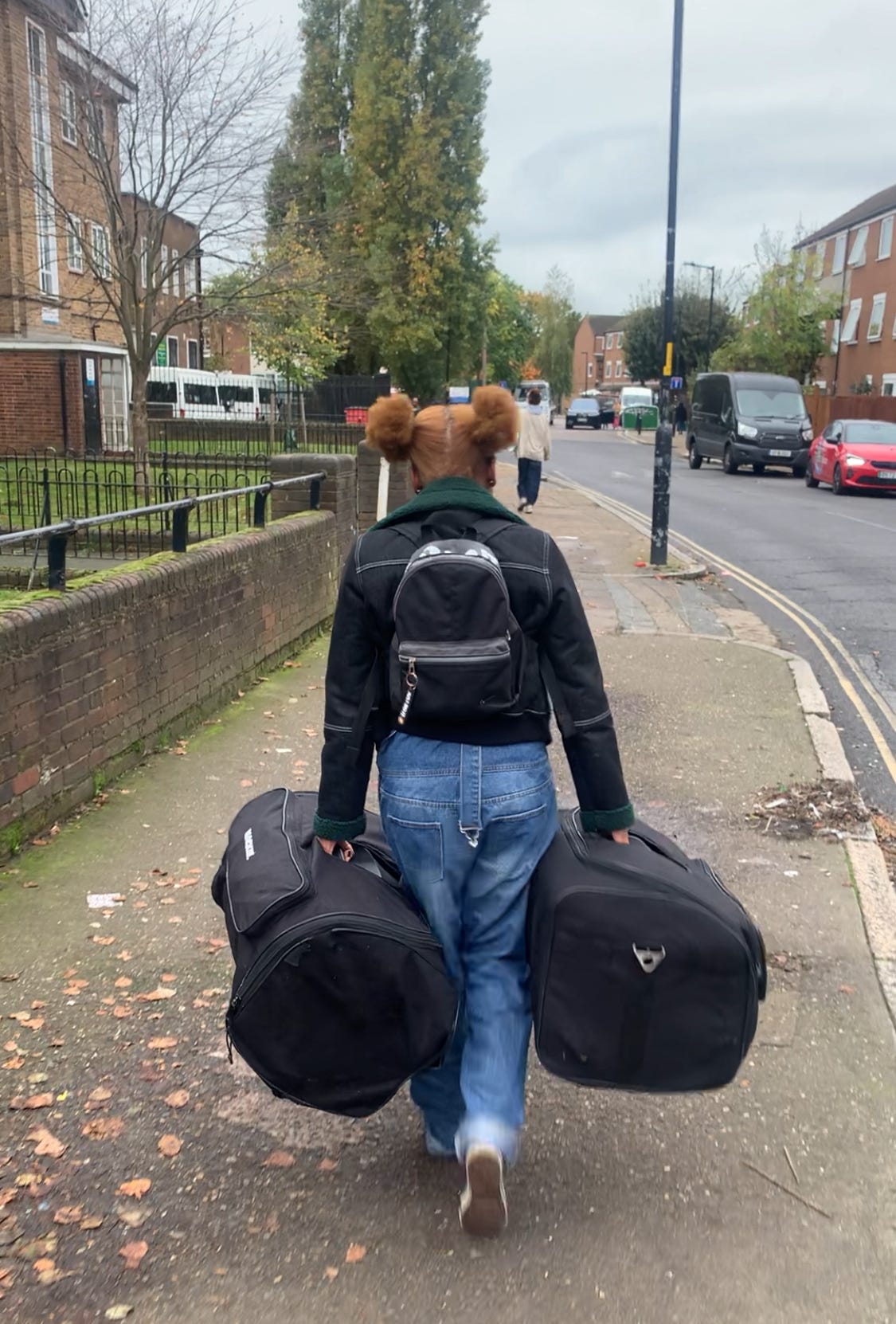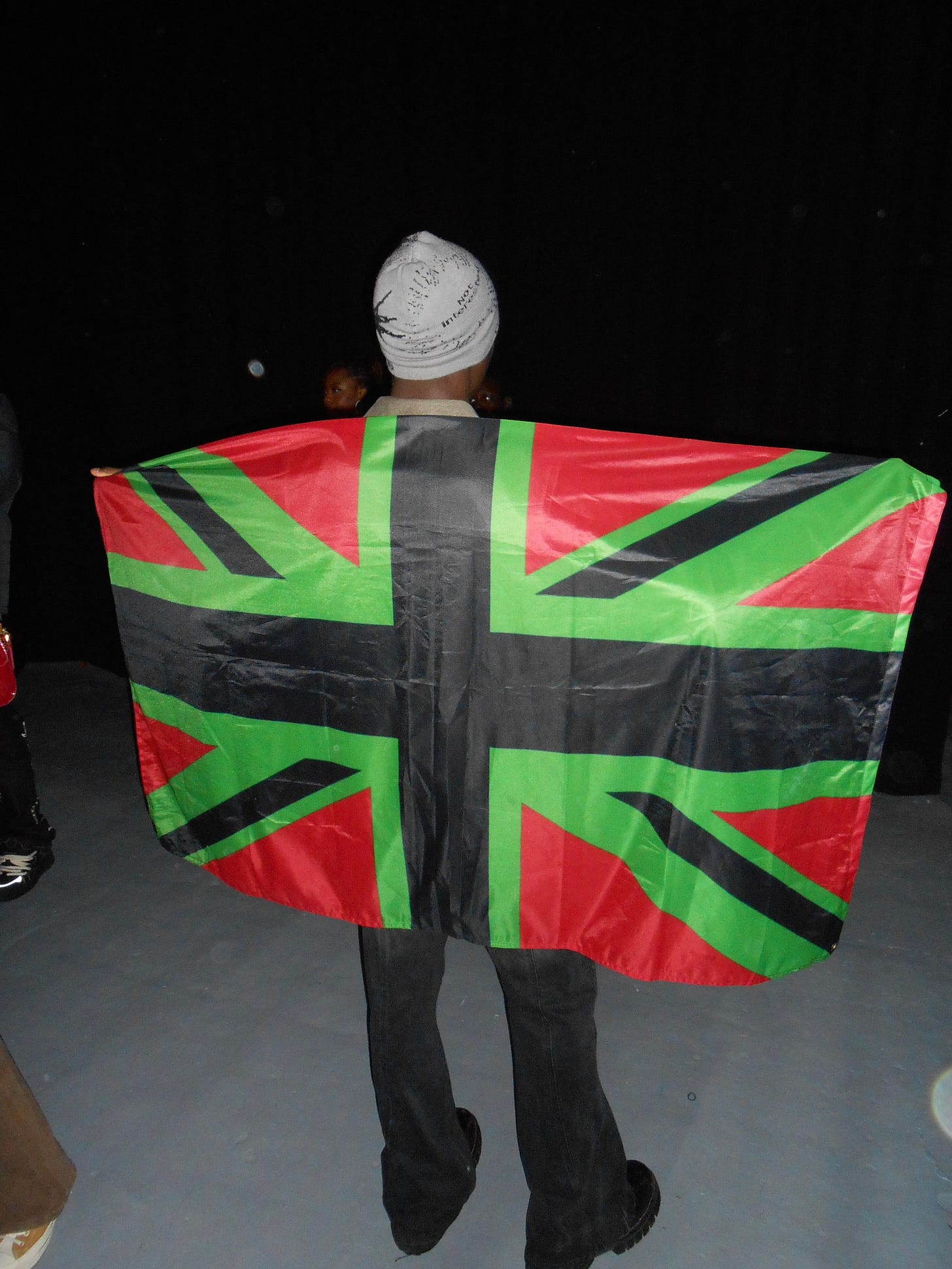27/10/2024
Black History Month seems to have less and less relevance each year. The BLM guilt has worn off, funding has dried up, and DEI backlash is booming. I forgot it was black history month at all. Back in 2020 I wrote an article titled ‘The Annual Disappointment of Black History Month’1. In this short piece I lamented the pandering that occurs every October, the trotting out of black employees and “first black so-and-sos” as signs of progress. In the four years since then such politics of inclusion has mutated into high visibility for the worst black people you’ve ever encountered. David Lammy now spends his days as Foreign Secretary forming creative ways to legitimise genocide in Palestine. Kemi Badenoch has just made her way into leading the Conservative party as the black face of fascism. I won’t say that I saw this coming back in 2020 or even that it is an unsurprising outcome but it seems now like an inevitability of a neoliberal order that metabolises identity into energy for racial capitalism’s reproduction. I concluded this article by viewing black history as “An aggregate of hopes, decisions and desires that have gone and only return in memories”. It is this history that constitutes us as both a collective and as individuals. The past is me, you, us. A true celebration of Black History Month then is one that continues the active pursuit and creation of black life that we have seen throughout time and space. Only now as I reflect on this article do I realise that its ideas have come to form the basis of my current political imaginary as both a PhD student and a party girl.
Throughout the ethnographies I have written on this blog I have consistently stressed the importance of viewing ourselves as active collaborators - whether as DJs, promoters, or partygoers - in the creation of a party so as to produce spaces that meet and foster space for our desires. Likewise, I have recently become enamoured by a union black. Plastered across TikTok for you pages have been my Black British ramblings in which I publicly ruminate on who we are and who we might be as a diverse people filled with conflict and contradictions under the umbrella of Black British. Really, it is no surprise that my call to institute the dictatorshiip of the party girl by tearing down the hierarchy that places organiser above dancer2 would lead me to seize the means of party production and make the party I wanted to see in the world. Maybe it’s the virgo in me that means I can never just let an idea remain an idea or let a complaint go unresolved. I like to put my money where my hating ass mouth is. It’s simply not enough to just observe problems in London’s party landscape or the grappling for some semblance of identity by black people in the UK when I am perfectly capable of at least attempting to put my own vision into practice. So when my Twitter mutual, Lizzy, rather casually put forward the idea of parties for Black History Month she set off neurons firing rapidly in my head as the image of a Black British party began to take shape.
With Halloween’s stronghold on the last two weekends of partying in October, we had two weeks to stake our claim to the 27th of October before partygoers’ plans were too set in stone to accommodate a Sunday evening soiree. Those two weeks just so happened to fall in the lead up to the submission of my very long and very important upgrade paper required for the continuation of my PhD (no paper means no PhD and no PhD means [redacted due to the graphic and violent nature of content]). Due to the seriousness of this assignment I was of course grateful to have dreamed up a new project with which I could productively procrastinate. My excursions to campus where I would typically sit at the same desk in the same secluded room devoid of natural light every day in the hopes of achieving some sort of progress in the writing of my paper soon transformed into days spent sending emails, drawing up a budget, working and reworking the party schedule, and pestering my sister to produce the poster she’d been tasked with making for the event. Any attempts to actually focus on my research quickly became periods of daydreaming that in turn produced a new task to distract myself with. "It’s ok,” I told myself, “cus this is actually what my research is about so like it doesn’t matter if I’m not working because technically this is the work.” I’m doing embodied research into parties mate it doesn’t get more embodied than literally making the party from scratch.
I began my PhD program last year with a rather clear and fixed notion of what a PhD student looks like. I suspect most people imagine this same figure. A super intelligent nerd, passionate about their studies. Nose constantly buried in one of the many books they get through each year, far more than the average person. They can always be found at the library, rarely at the club lest a bad hangover hamper their ability to do hard work. They leave the pub early to get a good nights sleep before returning to their studies the next day. Actually, why would they even be at the pub on a weekday? Does weekday vs weekend even matter to them? Every day is an opportunity to enrich themselves and their research. Of course they struggle like any student would but nevertheless they persevere.
I, on the other hand, spent almost the entirety of my first year of studies either at the pub, at the club, or hungover with the occasional pub/club trip overlapping with said hangover. Hair of the dog innit. And I wouldn’t say I’m not passionate about my studies but I do find reading a book to be the most difficult task in the world. In my brief dabbles in CBT when it seemed nothing else could solve my complete inability to do any fucking work I explained to my therapist that reading can certainly be enjoyable and I really do want to do it frequently but it’s like ugh like ughhhhh be honest guys it’s so fucking boring oh my goddddd. Genuinely, let’s cut the crap it’s just words on a page bro like nothing else. Literally just plain black and white. You can’t do anything else while you do it. You just have to sit there in silence because god knows nothing is going into that brain of yours if music is playing. I can’t handle that much serenity. If I even manage to pick up a book in the first place, it doesn’t matter how much I’m enjoying it, once I put it down I find myself in an excruciating battle to pick it up and subject myself to that stillness again. As such, I have found myself at war with myself via this figure of the ideal student I can never be. So much so that I finally opted to desert my PhD entirely in pursuit of the perfect party.
It would not be just any party, it would be a hall party. We had initially floated the idea of a street party but it was precisely the delightfulness of such an idea that made it evident that it was far too good to be true. There was not a chance in hell that we could get a permit for a bunch of black people to make noise in the streets and with just two weeks and no experience in the field I had no desire to attempt to set-up a block party outside the scope of the law. So what did our parents, grandparents, aunts, and uncles do in lieu of homes large enough to host parties? Where did they take their churches when owning property themselves was all but impossible? To the hall. They transformed community centres and primary schools into places to commune. Filled sports halls with tables, chairs, music, and the sweet spicy aromas of all sorts of rice and stews stored in hefty coolers. Made stages for year 6 pantomimes into pulpits. They made do.
This city, indeed this country, has certainly changed since the hall party I vaguely remember attending some time around a decade ago. I needn’t bore you with details of the abundantly apparent losses we have suffered in the realm of housing and social welfare. That a Kinder Bueno now costs £1.10 ought to be enough to illustrate our current state of affairs. But I find a strange comfort in the fact that these issues we face are not entirely new. Though it does seem to feel like everything is constantly getting exponentially worse by the day, our parents, grandparents, aunts, and uncles also struggled with housing and social welfare. They clamoured for some sense of stability in a society where blackness designates instability. Faced with inaccessible ideals of ownership and belonging in this racist nation, their dispossession did not mean that making a black place was impossible. Rather, as black geographer, Katherine McKittrick3 tells us, black people have long persisted in efforts to imagine and forge human life even as we are relegated to the margins by the racial order. The hall party is just one manifestation of this. For one night a hall became a place that is in England, but not quite4, as African culture arose mediated by the possibilities available in Britain. The task remains the same today: to make do, to fashion the limited materials available to us into a place where the possibilities of black life can be worked out.
After a week of prep and a £700 venue deposit split between Lizzy and I, I had more or less assembled a crew of visual artists, DJs, poets and a chef to constitute the party. And within just 2 hours of crossing my fingers, sharing the event flyer, and hoping Instagram wouldn’t decide this was the perfect time to ensure nobody saw my posts, tickets were completely sold out. I’m not sure how to describe the rush of dopamine that gave me. I was sat alone as per usual in my secluded little office space looking around in disbelief and excitement. It seemed there really was an appetite for black communal space that meant the money I was burning to ensure this offering could be free was worth it. That being said, my annual income comes from government funding for my PhD so really if you pay taxes here in the UK it was in fact you that paid for this party. Thank you for your service.
But I have to admit that it was about more than people showing interest in such a space. It made me feel seen. Finally a confirmation that I wasn’t insane for thinking I had something to offer the world. Don’t get me wrong, I have rarely lacked self-esteem. My issue has never been that I felt I wasn’t good enough but that the people around me just could not recognise it. For this reason, I often spent lunch breaks alone in primary school until it became clear that this was considered concerning to teachers. A few times I tried to hide in the bathroom so I wouldn’t have to bother hanging out with the other children. It wasn’t because I was bullied or they didn’t like me. It was because I knew they didn’t get me and I had no desire to spend my time trying to fit in with people I didn’t much like myself - even if I could. The same problem followed me all the way to college. I can definitively say I actually had no mates in college. I had a chance to make friends with two white girls at the start of the year but when one of them displayed confusion at the idea of my mum making me clean the bathtub because “the water from showering does that” it became apparent that we had nothing in common. I called my mum and pretended she had demanded that I return home. I’ve admittedly always had a belief or perhaps a fantasy that if the right people were just given the chance to talk to me, to see what I can do, they’d love me. Does that make me vain? Possibly. My problem for a good 24 years of my 25 years on this planet has simply been that I could never seem to reach those people. Until now. I’ve craved this feeling for so long and to be quite honest I think I really deserve it. I deserve to be seen.
When the weekend of the hall party arrived I simply could not wait to see how it would turn out. Exhausted and hungover from Zack Fox’s first night at Colour Factory, my sister and I headed to Kennington to pick up the speakers we’d be needing for Sunday and drop them off with some friends who lived near the venue. A walk that usually takes about 10 minutes became nearly an hour as we stopped and started and stopped and started and stopped again dragging the shockingly heavy speakers across a South London estate. We returned the next day, with the assistance of our friend, Arty, and a trolley nicked from the local Morrisons, to wheel the speakers over to the venue because we were too cheap to just get an Uber. You’d do it too if you’d spent £500 in a week. On arrival, we met the artists who’d been instructed to arrive early to set up their displays. After an hour or so of running around greeting late arrivals, trying desperately to get canvases to stick to the chalky walls, handing out artist descriptions I’d used some leftover credits to print off at my uni library earlier that morning, pestering my sister to take BTS videos, and fiddling with cables to get videos up and running on the projector and TV, the hall party commenced. Of course, black people don’t show up to anything on time really but music was playing, drinks were flowing, and people were beginning to trickle in. Friends, strangers, mutuals on twitter I’d been dying to meet in real life. When I’d finally stuck up the last poster, I took a second to down a Tequila Rita Buzzball and admire my work. Damn. This looks really good.
I’m not a fan of poetry. That’s what I decided to tell the now large crowd I’d plucked from the kitchen area where they’d been feasting on vegan jollof rice, rice and peas, egusi, pepperpot stew and plantain (courtesy of Garden of Afruika) to come listen to four poets’s performances. I was drunk off Buzzballs and the power to hold a room’s attention, so my introductions for each poet soon became a live, after-dark edition of my Black British ramblings. ‘I’m not a fan of poetry’ was unsurprisingly met with loud gasps. ‘Wait, wait, wait, let me land’, I shouted trying to get the crowd to see where this provocative and perhaps inappropriate statement was going. I’m not a fan of poetry and I know a few of you probably aren’t fans either. Let’s be honest. I’ve never really got it. Until right now, when I stopped trying to get it and started listening to the rhythm, trying to catch the beat. When black people speak you can feel it. That beat. Even if I struggle to grasp their words, I can find the beat and through it I can at least try to understand what they want to say.
I think that drunken comment weirdly described the events of that evening in Lambeth. When I had asked for poets to perform, I knew it wasn’t my cup of tea but I thought it might be someone’s so I wanted to make space for it. Frequently, the idea of community is one of universalism. One where difference is flattened, and we are all expected as members of the community to share one standpoint. We are supposed to be silent about our likes or dislikes if they threaten the presentation of a united front. But the reality is, I’m not a big fan of listening to poetry and nor are many other people. Likewise, plenty of people love listening to and performing poetry. We needn’t deny this truth to share a space together. Indeed, the beauty of that evening was that all sorts of people were in that room giving it a try. Willing to search for the beat wherever it might be. Whether in the poetry of a 21 year old filled with the spiritual fervour of a preacher and the rage of a freedom fighter, the music of a reserved 19 year old producer reconfiguring grime bars originally spat in 2008, or the art of a boisterous 23 year old painstakingly draped across a wall as a narration of our obscured histories.
For all my talk of being an awful PhD student (see introduction to drunk ethnography), through this party I’ve come to realise that by being so shit I’m actually like… pretty good at it. And here is a lesson that is applicable beyond my life as a researcher. What happens if I stop analysing things based on what I believe they should be and instead take them as they are? This is not some sappy ‘love yourself and be who you are’ motivational speech. Rather, it is a call to reassess our lens of analysis. Often we start from the premise of what we believe things should be. I had believed in an ideal type of student against which I could compare myself. If I did not meet the standards of that student then I could conclude that I was a bad student. But when the devastation of my acute awareness that I was nothing like this student became too much to bear I simply decided to stop fighting it. I concede that I am a fidgety binge drinker with a poor attention span who loves to go out and have fun with my friends. Sue me. I don’t see that changing any time soon so how can I achieve my goals knowing the hand I’ve been dealt? Well, in practice this looks like simply giving up when my brain feels to fried to produce anything of worth. Instead of working on my paper, I worked on the party and completely unintentionally the neurons firing away as I poured myself into making a space I could share with other Black Brits eventually journeyed down pathways that led right back to the content of my thesis. I had essentially tricked my brain into doing research (even if it did take me over a month to be able to write about the experience). I could not end this conflict between my party girl persona and idealised PhD persona without sacrificing one part of myself so I concluded that this conflict did not in fact need a resolution. This conflict had revealed the futility of attempting to neatly package black stories into one essential narrative. I cannot end the conflict because it is what makes me the multi-dimensional person I am. Instead I operate at the fault lines where my worlds collide, dancing playfully around the cracks to see the possibilities this collision might offer me. Here I have found that being a PhD student can entail partying hard and learning from my peers in the process.
Our parents, grandparents, aunts, and uncles followed this line of thought. Rather than remain passive in the face of disenfranchisement and merely complaining that the ideals of belonging in Britain were out of their reach, they observed the poor hand they had been dealt and sought nevertheless to make new modes of belonging in community centres and primary school sports halls. I’ve been trying to extend this thinking to the development of the Black British Hall Party beyond this event by considering the parallels between a party and a church5. Indeed, for British Nigerians like myself, the hall party is second only to the church insofar as it functions as a centre for social affairs6. I like hall parties, I’m not so fond of churches and the conservatism they peddle. But what if instead of analysing them based on what I believe they should be, I take them for what they are. By this I mean that I do not care for churches thanks to my own upbringing in them and observation of the harm they cause so, truthfully, my ideal church is one that ceases to exist. However, analysis conducted based not merely on my ideals but on the actual functions the church performs lead me to a different conclusion. Instead of casting aside the church in its entirety, I might aim to identify how the church maintains it’s grip on people, identify the genuine successes it achieves, and transform that towards my own political ends. Where the church has tended to conflict with black liberation, I might dance at the fault lines of their collision looking for its uses whilst avoiding falling into its conservative failings. So I refer you to the table below in which I have attempted to envision that transformation, to work with the materials already available to me thanks to a good 18 years spent as a church kid:
Since the first hall party, we’ve had a club night at The Haggerston which took on the mission of getting contemporary Black British music into the club. It was great to see an audience enthusiastic about our art and see the DJs masterfully succeed in the task of curating 100% Black British sets that would get people going. The next event will be a Christmas party featuring a Christmas dinner for which we’re asking all attendees to bring a dish. The aim here is to encourage people to view themselves as active contributors to the party. Under the dictatorship of the party girl there is no hierarchy of organiser and partygoer. Like a church, I want BBHP to be dependent on its congregation for sustenance. Unlike many churches, I want to recognise that this dependence means the needs of the people should always be at the centre. I am not a pastor. I do not speak from a pulpit and my word is not law. On the dance floor, in conversations over food, as we take in art, we are different but equal. We are working together to forge a community, a kinship, a friendship, a comradeship. Whatever you want to call it. We are all working at the fault lines where our different worlds collide and trying to understand one another. Working to find the beat so that we might dance the dance of black life.
Ajai-Thomas, R. (2020) The Annual Disappointment of Black History Month. Available at: https://christytoluwa.medium.com/the-annual-disappointment-of-black-history-month-f5b22b46688a
Ajai-Thomas, R. (2024) drunk ethnography #6: NIGERIAN INDEPENDANCE. Available at:
McKittrick, K. (2011) On Plantations, Prisons, and a Black Sense of Place. Social & Cultural Geography, 12(8), pp.947-963.
Adediran, D. (2022). Long Live The Nigerian Hall Party. Available at: https://thiswaymadnesslies.wordpress.com/long-live-the-nigerian-hall-party/
Inspired by this thread: https://x.com/aqua_or_bob/status/1852989148828717097?s=46
Adediran, D. (2022)" "










Wow, the parallels you drew with the way the church functions and a Hall party was amazing. As a church kid I really appreciated it!!